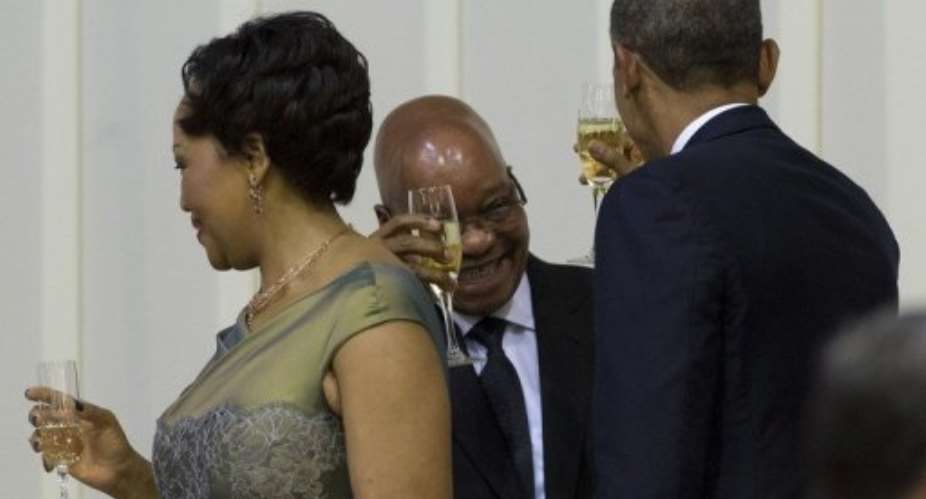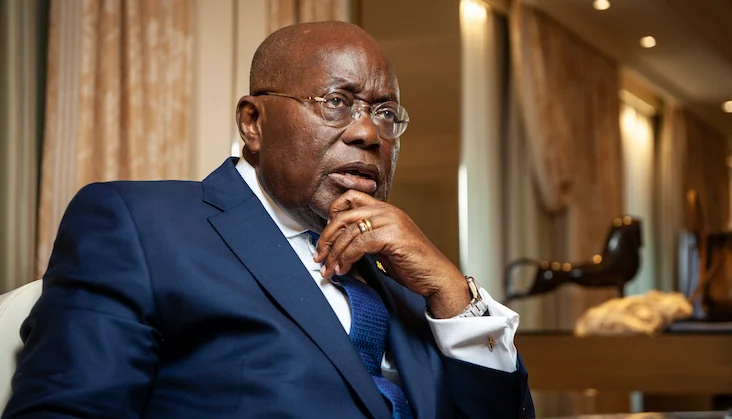JOHANNESBURG (AFP) - President Barack Obama on Sunday will stare into the stark cell where Nelson Mandela spent years as a political prisoner, in a visit paying homage to his ailing hero whom he was unable to see in Pretoria.
The US leader is on route to Cape Town where he will visit the prison on Robben Island, now preserved as a searing tribute to the sacrifice and unbreakable strength of the anti-apartheid leader.
"For me to be able to bring my daughters there and teach them the history of that place and this country... that's a great privilege and a great honour," said Obama, marvelling at a continued outpouring of love for South Africa's first black president.
Obama will also build the keynote speech of his three-nation Africa tour at the University of Cape Town around Mandela, and will cite his unifying legacy as a blueprint for a new generation in emerging Africa.
Mandela's illness placed Obama in a tricky political spot, forcing him to balance his desire to push for a new economic relationship with Africa, with the need to properly honour his hero, who has been in intensive care for more than three weeks.
On Saturday, Obama and his wife Michelle called Mandela's wife Graca Machel, and the president then privately visited several daughters and grandchildren of Mandela, to offer support and prayers.
But he decided against rolling up in his massive entourage at the Pretoria hospital where the 94-year-old Mandela lies, worried that he would disturb his peace.
"I expressed my hope that Madiba draws peace and comfort from the time that he is spending with loved ones," Obama said in a statement using Mandela's clan name.
Machel said she drew "strength from the support" of the Obama family.
The example of Mandela, who became South Africa's first black president, drew Obama into politics for the first time in the 1970s, putting him on a path that would lead to his own piece of history as America's first black president.
"The struggle here against apartheid, for freedom, Madiba's moral courage, his country's historic transition to a free and democratic nation, has been a personal inspiration to me," Obama said.
"It has been an inspiration to the world."
South African President Jacob Zuma said after talks with Obama Saturday that Mandela remained in a "critical but stable" condition with a recurring lung infection.
And he said that Obama and Mandela were "bound by history" after breaking racial barriers to rise to power.
"You both carry the dreams of millions of people in Africa," Zuma, who also spent 10 years on Robben island, told Obama.
South Africa's last apartheid president FW de Klerk meanwhile cut short a visit to Europe because of the ailing health of his co-Nobel Peace Prize winner.
Obama's warm welcome however was not universal. Riot police fired rubber bullets and stun grenades at around 300 hundred anti-Obama protesters in the township of Soweto, once a flashpoint in the anti-apartheid struggle.
His tour of Senegal, South Africa and Tanzania is aimed at changing perceptions that he has neglected Africa since his election in 2008, while also countering China's growing economic influence in the resource-rich continent.
On Sunday, a day ringing with political symbolism, the US president will be walking in revered footsteps when he gives a speech at the University of Cape Town -- those of slain US presidential candidate Robert Kennedy, brother of assassinated president John F. Kennedy.
RFK gave his famed "ripple of hope" speech at the same venue in 1966, which was a call for non-violent change and equality, at a time when America was still dealing with the racial discrimination which stained its own history.
Kennedy gave the speech only two years after Mandela was sentenced to life in prison and sent to Robben Island.
Obama will also unveil a plan, worth $7 billion over five years, to upgrade African power networks in a bid to reduce electricity cuts and blackouts that scare off business investment, the White House said.
"The goal of Power Africa is to double access to power in sub-Saharan Africa, which would be a significant, game-changing development for people across the continent given the connection between electricity and the ability of people to be healthy and to learn, to start businesses," a US official said.
Mandela, once branded a terrorist by the United States and Britain, was freed in 1990 and became president after the first fully democratic elections in 1994.
Also Sunday, Obama, accompanied on his tour by his wife and daughters Malia and Sasha, will visit an HIV/AIDS Centre named for another icon of South Africa's emancipation struggle, Archbishop Desmond Tutu.





 Mahama was a one-term president because he was incompetent and brought untold ha...
Mahama was a one-term president because he was incompetent and brought untold ha...
 Shortage of ‘bentua’ hits Accra Central Market
Shortage of ‘bentua’ hits Accra Central Market
 Blame IMF programme for Cedi's decline —Prof Bokpin
Blame IMF programme for Cedi's decline —Prof Bokpin
 Court denies Kasoa soldier killer bail
Court denies Kasoa soldier killer bail
 All crooked deals are cooked at Jubilee House – Franklin Cudjoe
All crooked deals are cooked at Jubilee House – Franklin Cudjoe
 Don’t be tricked by Mahama’s rebranding move – Richard Ahiagbah to Ghanaians
Don’t be tricked by Mahama’s rebranding move – Richard Ahiagbah to Ghanaians
 Petition against Kissi Agyebeng not surprising – Justice Srem Sai
Petition against Kissi Agyebeng not surprising – Justice Srem Sai
 Akufo-Addo’s handling of petitions against top officials disappointing – Justice...
Akufo-Addo’s handling of petitions against top officials disappointing – Justice...
 Osino: ‘Sleeping’ tipper truck driver runs into building
Osino: ‘Sleeping’ tipper truck driver runs into building
 Ahmed Suale's killers will be brought to justice no matter how long it takes - A...
Ahmed Suale's killers will be brought to justice no matter how long it takes - A...
